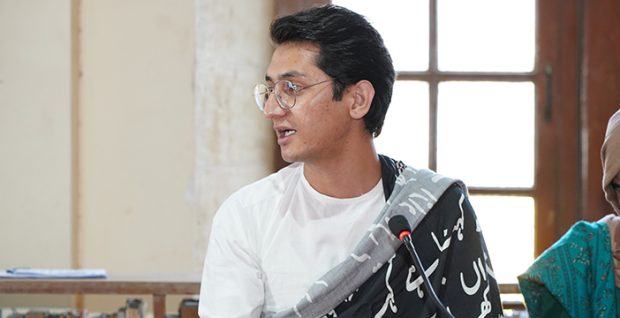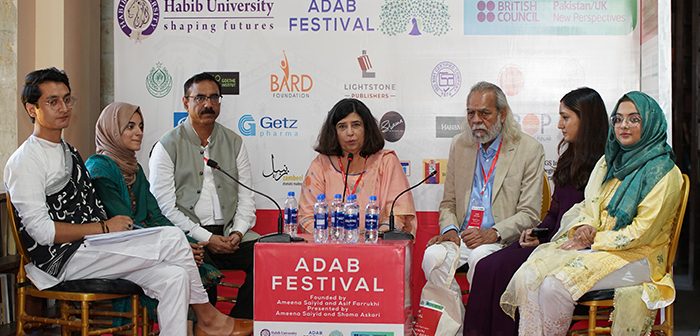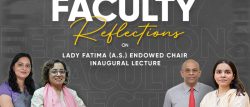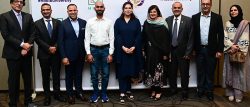You may not make good machines by reading “Mir (Meer)” but you will become a good human being!
Adab Festival 2023: Imperialism does not only expropriate the resources of the colonies but it also snatches language, culture, and one’s inner self. Cultural imperialism has remained prevalent in the cultural and socio-political lives of all the ex-British colonies including Pakistan. Languages also kill other languages; one language dies every 14 days and disappears from the memories of the people. Cultural imperialism deletes indigenous memories and history. Hence, the native languages have suffered under the hegemonic shackles of linguistic neo-colonialism aimed at disempowering the local linguistic communities. In the exclusivist environment of English domination surrounding higher education in Pakistan, Habib University has taken a radical step to include the Urdu Literature course, Jehan-e-Urdu, as one of the liberal core courses of all academic programs.
In the session, Habib University Ka Jehan-e-Urdu at the Frere Hall, Karachi, Dr. Tanveer Anjum, an adjunct faculty at Habib University moderated the session. Afzal Ahmed Syed, Professor of Practice, and Comparative Studies, Professor Inamullah Nadeem, poet, author, writer, and Assistant Professor of Practice, Comparative Humanities, Habib Mazahir, Alumni and Academic Advisor at Habib University, Alifya Faheem Lotia, Syeda Dua Zahra Zaidi, and Samana Butul, students of Habib University, were the speakers.
Afzal Ahmed Syed said it is the vision of Habib University that we teach philosophy, arts, literature, reasoning, language, and music. Habib university believes in Yohsin, it encompasses five major paradigms: striving for Excellence; appreciating Aesthetics (beauty); nurturing Passion; Respecting others, and serving the communities. It is the literature that injects humanity into the souls of human beings and Habib University passionately believes in this.
Dr. Inaamullah Nadeem told that when a student from the engineering department asked why they had to study “Mir Taqi Mir (Meer Taqi Meer)” he answered to him, “You may not make good machines by reading “Mir (Meer)” but you will become a good human being.” Adding further, he told, in our societies, we read books when we are feeling bored or have to spend time. Humans have a noticeably brief period, and they cannot experience everything, books teach, and provide experiences, and feelings.
We have taught those characters of “Manto (Saadat Hasan Manto)” which are considered bad in our societies but when students read about their feelings and sacrifices, they change their understanding towards them. At Habib university, students unlearn and we challenge the existing cultural imperialism of the English language.
Habib Mazahir said that “Habib University has bestowed us our lost language and culture. It is literature which enlightens the students.” Emphasizing the importance of the Urdu language, he said, “We should be ashamed that we don’t know Urdu, we are facing an epistemological crisis, we are into deep self-hatred to ourselves and our places due to cultural imperialism. We need to overcome this linguistic apartheid.”

“The academic and linguistic crises that we are facing today can effectively be solved through staying connected with our language, literature, and culture.” – Habib Mazahir, Academic Advisor and Alumni.
Habib spoke so fluently and beautifully in Urdu that the moderator asked him, “Could you speak like this before joining Habib University?” he replied, “Indeed, in this all, credit goes to Habib University.”
Samana Butul, a student of Habib university told that there is a difference between language and literature, and Habib University taught this. We not only learned about Faiz and Ghalib but also the “Zinda Shair” of those poets who are alive. We listen and learn about Ghazals, Poetry, and music at Habib university and that is why I am in love with Urdu and it has become my habit.
Syeda Dua Zahra Zaidi said, “When I came to University, I learned Urdu as a feeling. Urdu taught us to feel and know ourselves. When one knows oneself can know about the outside world.”
Alifya Faheem Lotia told that when she joined Habib university, she could not memorize poetry but now she knew. She recited Faiz Ahmed’s “Aaj Bazaar Main” so beautifully, the audience cherished her with clapping and appreciation. In the end, Dr. Tanveer emphasized reclaiming lost languages, literature, culture, and civilization.




